Exploring the Biopsychosocial Model in Abnormal Psychology: A Study
VerifiedAdded on 2022/09/23
|11
|2470
|35
Essay
AI Summary
This essay provides an in-depth analysis of the biopsychosocial model in the context of abnormal psychology. It begins by defining abnormal psychology and its focus on unusual patterns of emotions, behaviors, and thoughts. The essay then elaborates on the biopsychosocial model, emphasizing the interplay of biological, psychological, and social-ecological factors in the development, maintenance, and management of psychological disorders. It explores the psychological components like emotional turmoil and negative thinking. The essay also discusses the causes of abnormal psychology, including imbalances in brain chemicals, childhood experiences, and genetics, as well as environmental factors. The diagnostic criteria, particularly the DSM-5, are explained, along with various models of abnormality such as cognitive, behavioral, biological, and psychodynamic models. Finally, the essay examines treatment approaches like psychotherapy and pharmacological interventions, highlighting the influence of cultural factors. The conclusion emphasizes the importance of the biopsychosocial model in understanding and addressing psychological disorders.
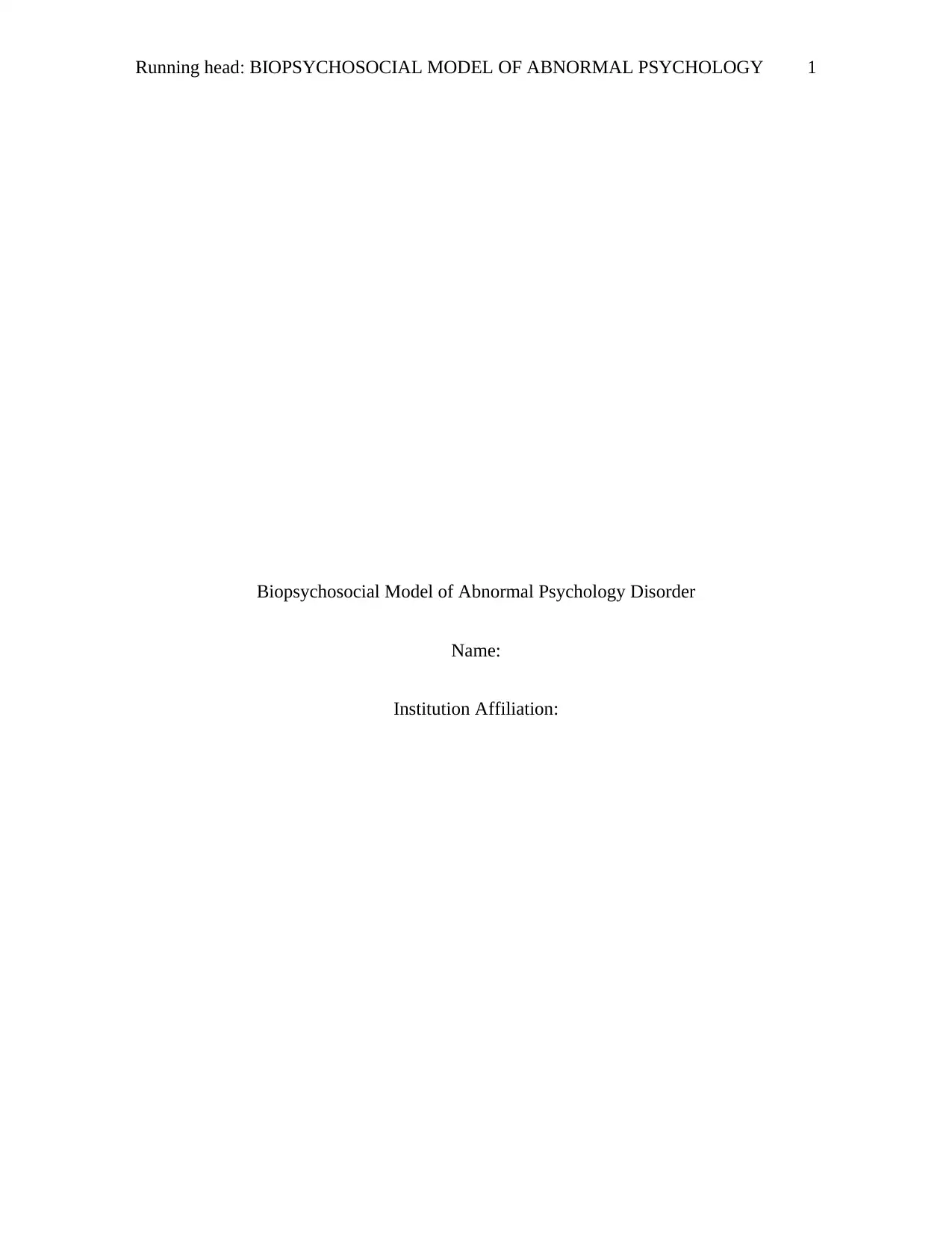
Running head BIOPSYCHOSOCIAL MODEL OF ABNORMAL PSYCHOLOGY 1
Biopsychosocial Model of Abnormal Psychology Disorder
Name:
Institution Affiliation:
Biopsychosocial Model of Abnormal Psychology Disorder
Name:
Institution Affiliation:
Paraphrase This Document
Need a fresh take? Get an instant paraphrase of this document with our AI Paraphraser
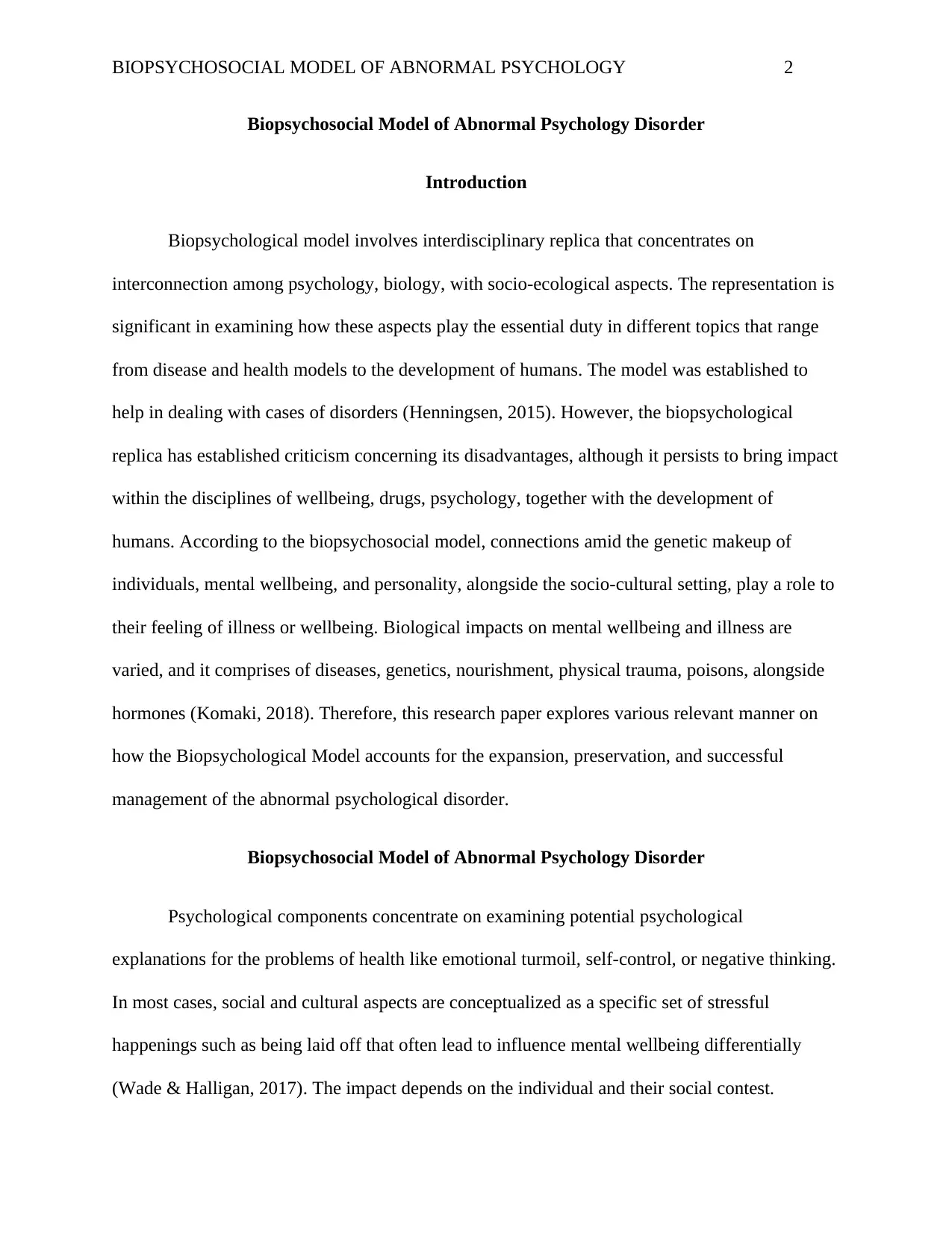
BIOPSYCHOSOCIAL MODEL OF ABNORMAL PSYCHOLOGY 2
Biopsychosocial Model of Abnormal Psychology Disorder
Introduction
Biopsychological model involves interdisciplinary replica that concentrates on
interconnection among psychology, biology, with socio-ecological aspects. The representation is
significant in examining how these aspects play the essential duty in different topics that range
from disease and health models to the development of humans. The model was established to
help in dealing with cases of disorders (Henningsen, 2015). However, the biopsychological
replica has established criticism concerning its disadvantages, although it persists to bring impact
within the disciplines of wellbeing, drugs, psychology, together with the development of
humans. According to the biopsychosocial model, connections amid the genetic makeup of
individuals, mental wellbeing, and personality, alongside the socio-cultural setting, play a role to
their feeling of illness or wellbeing. Biological impacts on mental wellbeing and illness are
varied, and it comprises of diseases, genetics, nourishment, physical trauma, poisons, alongside
hormones (Komaki, 2018). Therefore, this research paper explores various relevant manner on
how the Biopsychological Model accounts for the expansion, preservation, and successful
management of the abnormal psychological disorder.
Biopsychosocial Model of Abnormal Psychology Disorder
Psychological components concentrate on examining potential psychological
explanations for the problems of health like emotional turmoil, self-control, or negative thinking.
In most cases, social and cultural aspects are conceptualized as a specific set of stressful
happenings such as being laid off that often lead to influence mental wellbeing differentially
(Wade & Halligan, 2017). The impact depends on the individual and their social contest.
Biopsychosocial Model of Abnormal Psychology Disorder
Introduction
Biopsychological model involves interdisciplinary replica that concentrates on
interconnection among psychology, biology, with socio-ecological aspects. The representation is
significant in examining how these aspects play the essential duty in different topics that range
from disease and health models to the development of humans. The model was established to
help in dealing with cases of disorders (Henningsen, 2015). However, the biopsychological
replica has established criticism concerning its disadvantages, although it persists to bring impact
within the disciplines of wellbeing, drugs, psychology, together with the development of
humans. According to the biopsychosocial model, connections amid the genetic makeup of
individuals, mental wellbeing, and personality, alongside the socio-cultural setting, play a role to
their feeling of illness or wellbeing. Biological impacts on mental wellbeing and illness are
varied, and it comprises of diseases, genetics, nourishment, physical trauma, poisons, alongside
hormones (Komaki, 2018). Therefore, this research paper explores various relevant manner on
how the Biopsychological Model accounts for the expansion, preservation, and successful
management of the abnormal psychological disorder.
Biopsychosocial Model of Abnormal Psychology Disorder
Psychological components concentrate on examining potential psychological
explanations for the problems of health like emotional turmoil, self-control, or negative thinking.
In most cases, social and cultural aspects are conceptualized as a specific set of stressful
happenings such as being laid off that often lead to influence mental wellbeing differentially
(Wade & Halligan, 2017). The impact depends on the individual and their social contest.
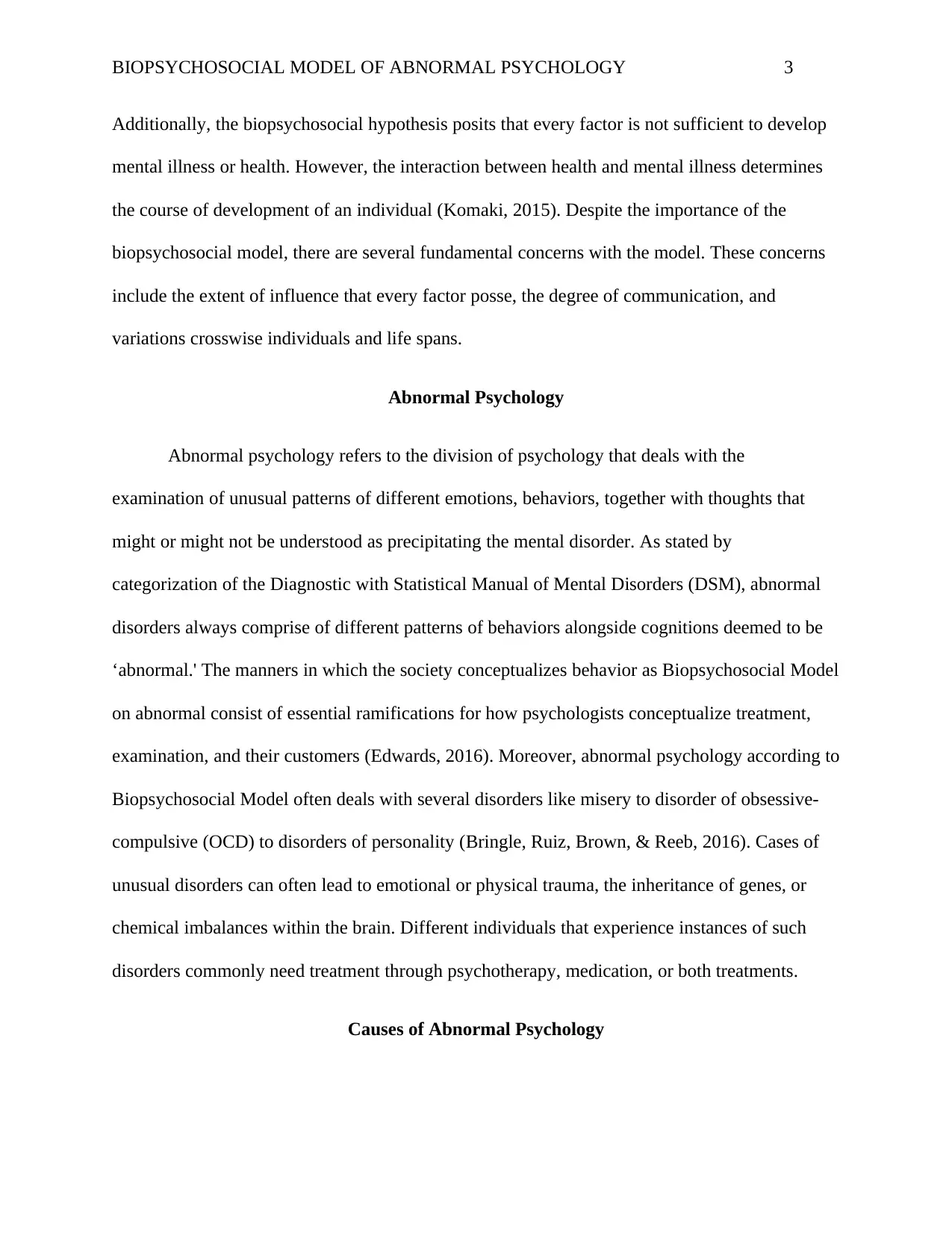
BIOPSYCHOSOCIAL MODEL OF ABNORMAL PSYCHOLOGY 3
Additionally, the biopsychosocial hypothesis posits that every factor is not sufficient to develop
mental illness or health. However, the interaction between health and mental illness determines
the course of development of an individual (Komaki, 2015). Despite the importance of the
biopsychosocial model, there are several fundamental concerns with the model. These concerns
include the extent of influence that every factor posse, the degree of communication, and
variations crosswise individuals and life spans.
Abnormal Psychology
Abnormal psychology refers to the division of psychology that deals with the
examination of unusual patterns of different emotions, behaviors, together with thoughts that
might or might not be understood as precipitating the mental disorder. As stated by
categorization of the Diagnostic with Statistical Manual of Mental Disorders (DSM), abnormal
disorders always comprise of different patterns of behaviors alongside cognitions deemed to be
‘abnormal.' The manners in which the society conceptualizes behavior as Biopsychosocial Model
on abnormal consist of essential ramifications for how psychologists conceptualize treatment,
examination, and their customers (Edwards, 2016). Moreover, abnormal psychology according to
Biopsychosocial Model often deals with several disorders like misery to disorder of obsessive-
compulsive (OCD) to disorders of personality (Bringle, Ruiz, Brown, & Reeb, 2016). Cases of
unusual disorders can often lead to emotional or physical trauma, the inheritance of genes, or
chemical imbalances within the brain. Different individuals that experience instances of such
disorders commonly need treatment through psychotherapy, medication, or both treatments.
Causes of Abnormal Psychology
Additionally, the biopsychosocial hypothesis posits that every factor is not sufficient to develop
mental illness or health. However, the interaction between health and mental illness determines
the course of development of an individual (Komaki, 2015). Despite the importance of the
biopsychosocial model, there are several fundamental concerns with the model. These concerns
include the extent of influence that every factor posse, the degree of communication, and
variations crosswise individuals and life spans.
Abnormal Psychology
Abnormal psychology refers to the division of psychology that deals with the
examination of unusual patterns of different emotions, behaviors, together with thoughts that
might or might not be understood as precipitating the mental disorder. As stated by
categorization of the Diagnostic with Statistical Manual of Mental Disorders (DSM), abnormal
disorders always comprise of different patterns of behaviors alongside cognitions deemed to be
‘abnormal.' The manners in which the society conceptualizes behavior as Biopsychosocial Model
on abnormal consist of essential ramifications for how psychologists conceptualize treatment,
examination, and their customers (Edwards, 2016). Moreover, abnormal psychology according to
Biopsychosocial Model often deals with several disorders like misery to disorder of obsessive-
compulsive (OCD) to disorders of personality (Bringle, Ruiz, Brown, & Reeb, 2016). Cases of
unusual disorders can often lead to emotional or physical trauma, the inheritance of genes, or
chemical imbalances within the brain. Different individuals that experience instances of such
disorders commonly need treatment through psychotherapy, medication, or both treatments.
Causes of Abnormal Psychology
⊘ This is a preview!⊘
Do you want full access?
Subscribe today to unlock all pages.

Trusted by 1+ million students worldwide
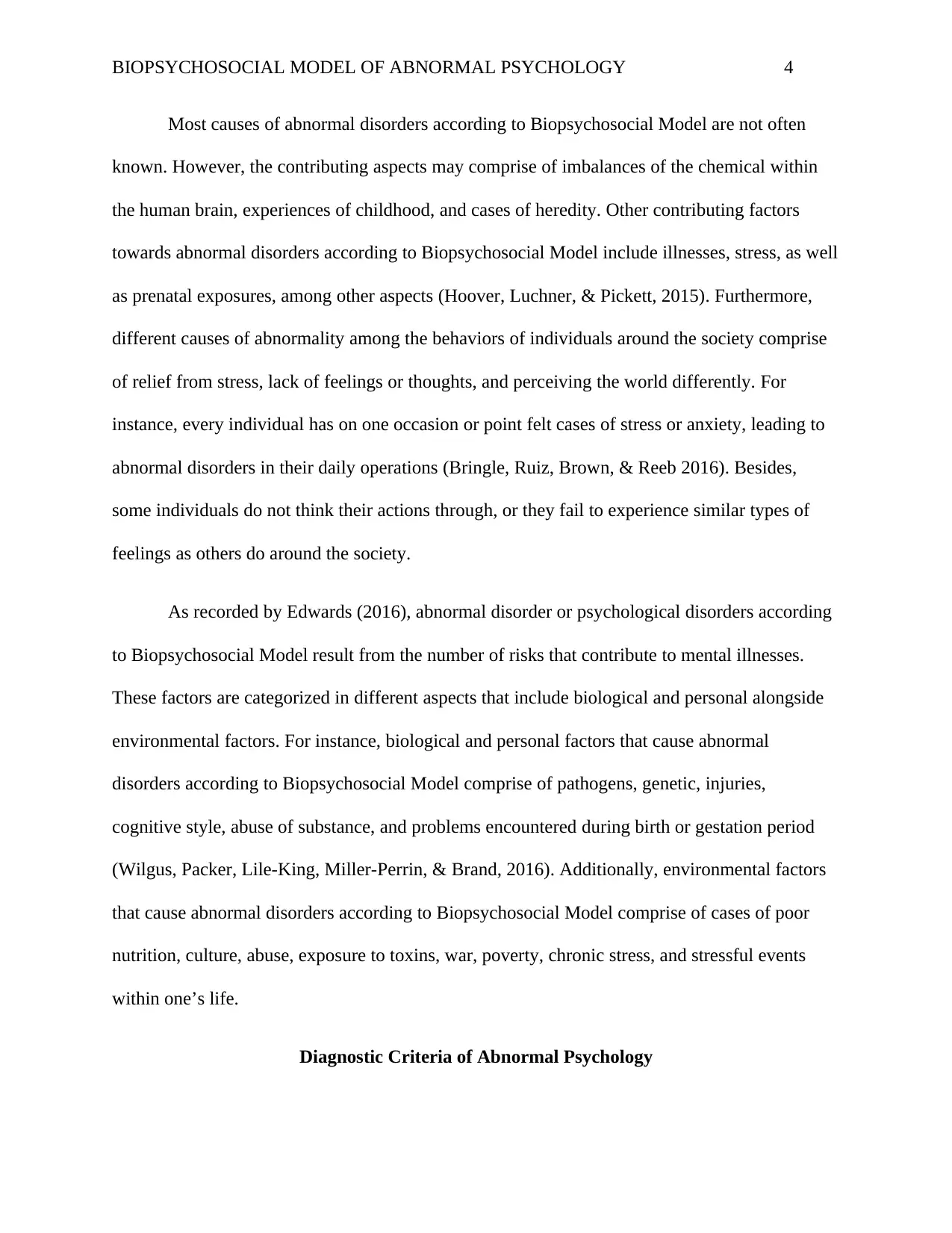
BIOPSYCHOSOCIAL MODEL OF ABNORMAL PSYCHOLOGY 4
Most causes of abnormal disorders according to Biopsychosocial Model are not often
known. However, the contributing aspects may comprise of imbalances of the chemical within
the human brain, experiences of childhood, and cases of heredity. Other contributing factors
towards abnormal disorders according to Biopsychosocial Model include illnesses, stress, as well
as prenatal exposures, among other aspects (Hoover, Luchner, & Pickett, 2015). Furthermore,
different causes of abnormality among the behaviors of individuals around the society comprise
of relief from stress, lack of feelings or thoughts, and perceiving the world differently. For
instance, every individual has on one occasion or point felt cases of stress or anxiety, leading to
abnormal disorders in their daily operations (Bringle, Ruiz, Brown, & Reeb 2016). Besides,
some individuals do not think their actions through, or they fail to experience similar types of
feelings as others do around the society.
As recorded by Edwards (2016), abnormal disorder or psychological disorders according
to Biopsychosocial Model result from the number of risks that contribute to mental illnesses.
These factors are categorized in different aspects that include biological and personal alongside
environmental factors. For instance, biological and personal factors that cause abnormal
disorders according to Biopsychosocial Model comprise of pathogens, genetic, injuries,
cognitive style, abuse of substance, and problems encountered during birth or gestation period
(Wilgus, Packer, Lile-King, Miller-Perrin, & Brand, 2016). Additionally, environmental factors
that cause abnormal disorders according to Biopsychosocial Model comprise of cases of poor
nutrition, culture, abuse, exposure to toxins, war, poverty, chronic stress, and stressful events
within one’s life.
Diagnostic Criteria of Abnormal Psychology
Most causes of abnormal disorders according to Biopsychosocial Model are not often
known. However, the contributing aspects may comprise of imbalances of the chemical within
the human brain, experiences of childhood, and cases of heredity. Other contributing factors
towards abnormal disorders according to Biopsychosocial Model include illnesses, stress, as well
as prenatal exposures, among other aspects (Hoover, Luchner, & Pickett, 2015). Furthermore,
different causes of abnormality among the behaviors of individuals around the society comprise
of relief from stress, lack of feelings or thoughts, and perceiving the world differently. For
instance, every individual has on one occasion or point felt cases of stress or anxiety, leading to
abnormal disorders in their daily operations (Bringle, Ruiz, Brown, & Reeb 2016). Besides,
some individuals do not think their actions through, or they fail to experience similar types of
feelings as others do around the society.
As recorded by Edwards (2016), abnormal disorder or psychological disorders according
to Biopsychosocial Model result from the number of risks that contribute to mental illnesses.
These factors are categorized in different aspects that include biological and personal alongside
environmental factors. For instance, biological and personal factors that cause abnormal
disorders according to Biopsychosocial Model comprise of pathogens, genetic, injuries,
cognitive style, abuse of substance, and problems encountered during birth or gestation period
(Wilgus, Packer, Lile-King, Miller-Perrin, & Brand, 2016). Additionally, environmental factors
that cause abnormal disorders according to Biopsychosocial Model comprise of cases of poor
nutrition, culture, abuse, exposure to toxins, war, poverty, chronic stress, and stressful events
within one’s life.
Diagnostic Criteria of Abnormal Psychology
Paraphrase This Document
Need a fresh take? Get an instant paraphrase of this document with our AI Paraphraser
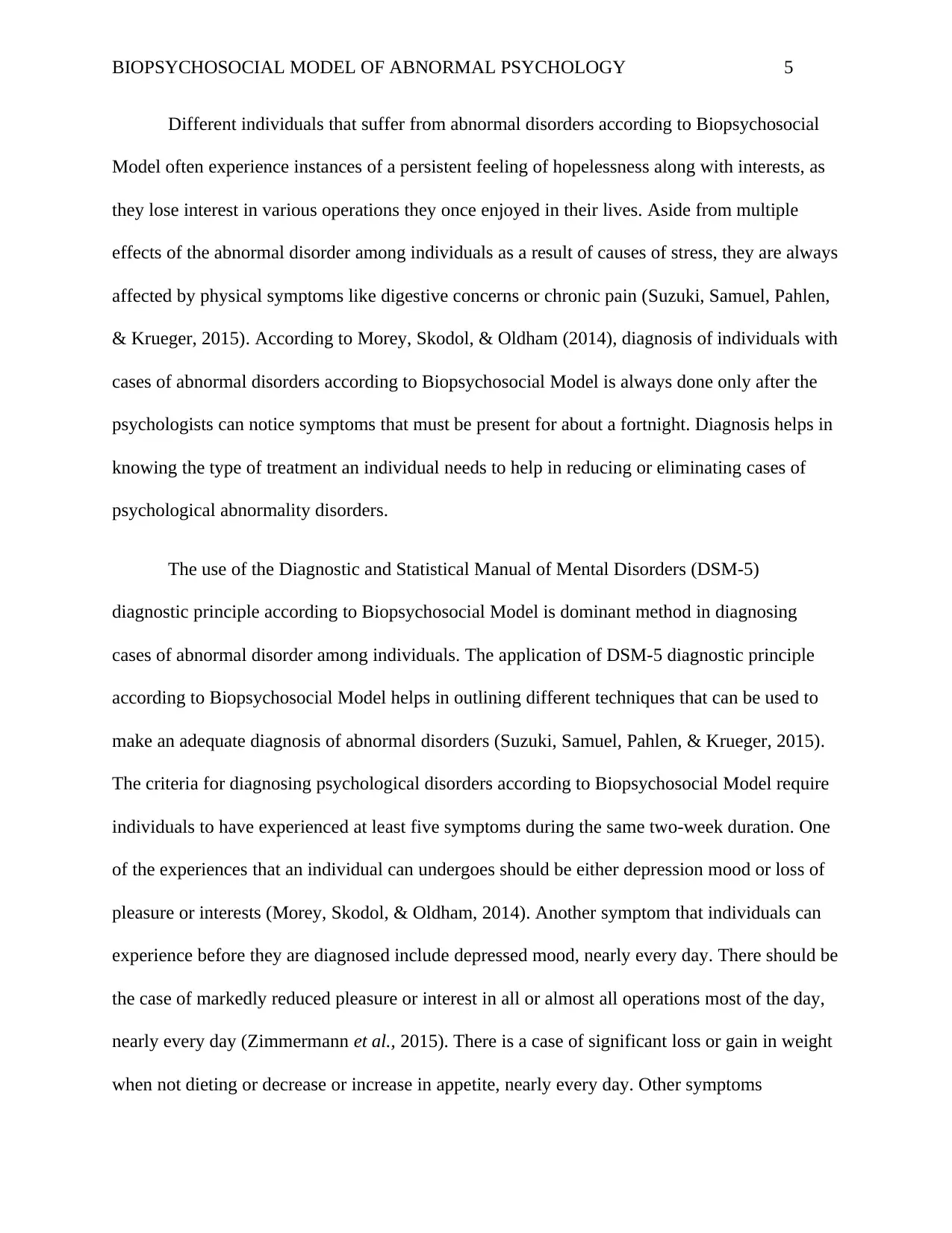
BIOPSYCHOSOCIAL MODEL OF ABNORMAL PSYCHOLOGY 5
Different individuals that suffer from abnormal disorders according to Biopsychosocial
Model often experience instances of a persistent feeling of hopelessness along with interests, as
they lose interest in various operations they once enjoyed in their lives. Aside from multiple
effects of the abnormal disorder among individuals as a result of causes of stress, they are always
affected by physical symptoms like digestive concerns or chronic pain (Suzuki, Samuel, Pahlen,
& Krueger, 2015). According to Morey, Skodol, & Oldham (2014), diagnosis of individuals with
cases of abnormal disorders according to Biopsychosocial Model is always done only after the
psychologists can notice symptoms that must be present for about a fortnight. Diagnosis helps in
knowing the type of treatment an individual needs to help in reducing or eliminating cases of
psychological abnormality disorders.
The use of the Diagnostic and Statistical Manual of Mental Disorders (DSM-5)
diagnostic principle according to Biopsychosocial Model is dominant method in diagnosing
cases of abnormal disorder among individuals. The application of DSM-5 diagnostic principle
according to Biopsychosocial Model helps in outlining different techniques that can be used to
make an adequate diagnosis of abnormal disorders (Suzuki, Samuel, Pahlen, & Krueger, 2015).
The criteria for diagnosing psychological disorders according to Biopsychosocial Model require
individuals to have experienced at least five symptoms during the same two-week duration. One
of the experiences that an individual can undergoes should be either depression mood or loss of
pleasure or interests (Morey, Skodol, & Oldham, 2014). Another symptom that individuals can
experience before they are diagnosed include depressed mood, nearly every day. There should be
the case of markedly reduced pleasure or interest in all or almost all operations most of the day,
nearly every day (Zimmermann et al., 2015). There is a case of significant loss or gain in weight
when not dieting or decrease or increase in appetite, nearly every day. Other symptoms
Different individuals that suffer from abnormal disorders according to Biopsychosocial
Model often experience instances of a persistent feeling of hopelessness along with interests, as
they lose interest in various operations they once enjoyed in their lives. Aside from multiple
effects of the abnormal disorder among individuals as a result of causes of stress, they are always
affected by physical symptoms like digestive concerns or chronic pain (Suzuki, Samuel, Pahlen,
& Krueger, 2015). According to Morey, Skodol, & Oldham (2014), diagnosis of individuals with
cases of abnormal disorders according to Biopsychosocial Model is always done only after the
psychologists can notice symptoms that must be present for about a fortnight. Diagnosis helps in
knowing the type of treatment an individual needs to help in reducing or eliminating cases of
psychological abnormality disorders.
The use of the Diagnostic and Statistical Manual of Mental Disorders (DSM-5)
diagnostic principle according to Biopsychosocial Model is dominant method in diagnosing
cases of abnormal disorder among individuals. The application of DSM-5 diagnostic principle
according to Biopsychosocial Model helps in outlining different techniques that can be used to
make an adequate diagnosis of abnormal disorders (Suzuki, Samuel, Pahlen, & Krueger, 2015).
The criteria for diagnosing psychological disorders according to Biopsychosocial Model require
individuals to have experienced at least five symptoms during the same two-week duration. One
of the experiences that an individual can undergoes should be either depression mood or loss of
pleasure or interests (Morey, Skodol, & Oldham, 2014). Another symptom that individuals can
experience before they are diagnosed include depressed mood, nearly every day. There should be
the case of markedly reduced pleasure or interest in all or almost all operations most of the day,
nearly every day (Zimmermann et al., 2015). There is a case of significant loss or gain in weight
when not dieting or decrease or increase in appetite, nearly every day. Other symptoms
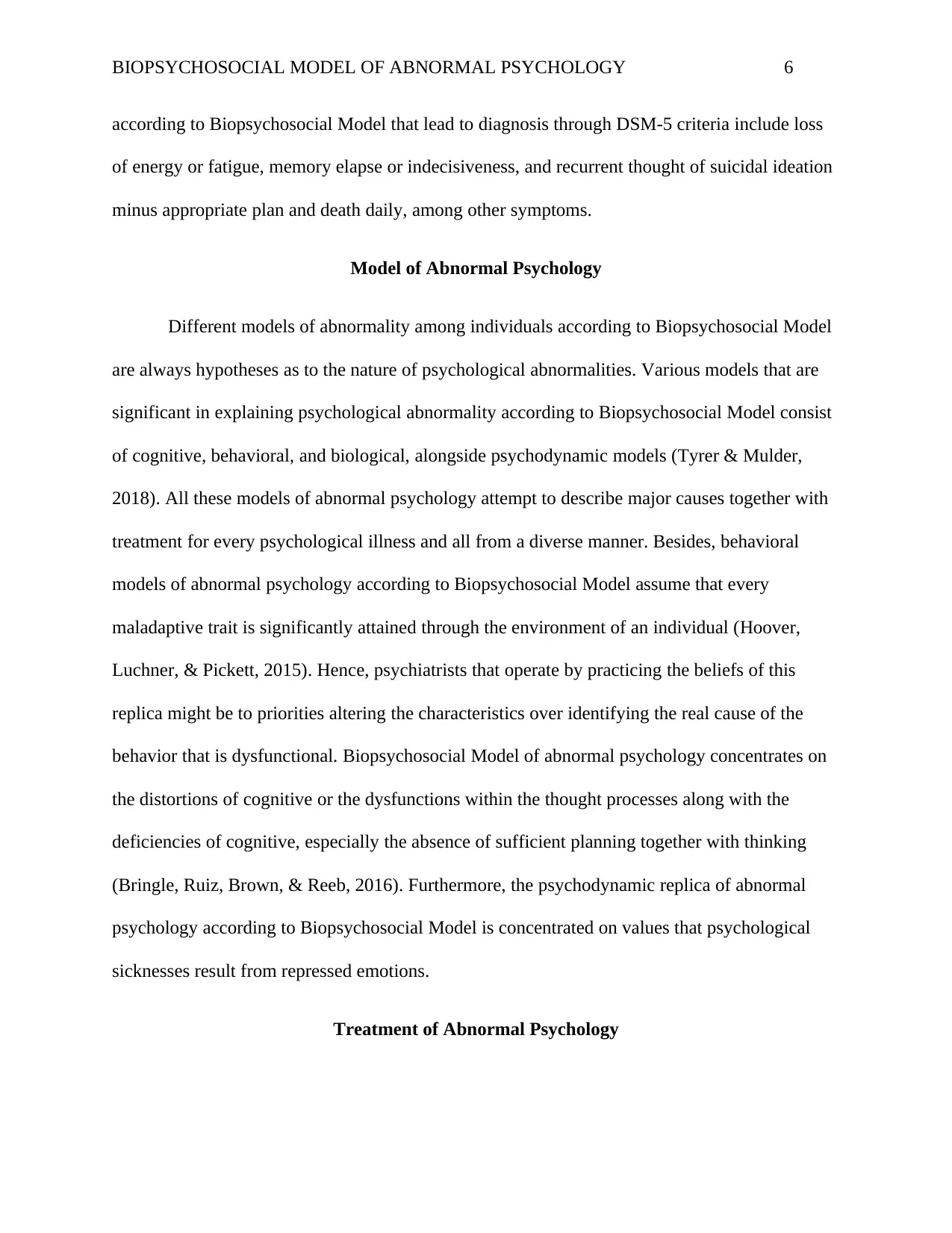
BIOPSYCHOSOCIAL MODEL OF ABNORMAL PSYCHOLOGY 6
according to Biopsychosocial Model that lead to diagnosis through DSM-5 criteria include loss
of energy or fatigue, memory elapse or indecisiveness, and recurrent thought of suicidal ideation
minus appropriate plan and death daily, among other symptoms.
Model of Abnormal Psychology
Different models of abnormality among individuals according to Biopsychosocial Model
are always hypotheses as to the nature of psychological abnormalities. Various models that are
significant in explaining psychological abnormality according to Biopsychosocial Model consist
of cognitive, behavioral, and biological, alongside psychodynamic models (Tyrer & Mulder,
2018). All these models of abnormal psychology attempt to describe major causes together with
treatment for every psychological illness and all from a diverse manner. Besides, behavioral
models of abnormal psychology according to Biopsychosocial Model assume that every
maladaptive trait is significantly attained through the environment of an individual (Hoover,
Luchner, & Pickett, 2015). Hence, psychiatrists that operate by practicing the beliefs of this
replica might be to priorities altering the characteristics over identifying the real cause of the
behavior that is dysfunctional. Biopsychosocial Model of abnormal psychology concentrates on
the distortions of cognitive or the dysfunctions within the thought processes along with the
deficiencies of cognitive, especially the absence of sufficient planning together with thinking
(Bringle, Ruiz, Brown, & Reeb, 2016). Furthermore, the psychodynamic replica of abnormal
psychology according to Biopsychosocial Model is concentrated on values that psychological
sicknesses result from repressed emotions.
Treatment of Abnormal Psychology
according to Biopsychosocial Model that lead to diagnosis through DSM-5 criteria include loss
of energy or fatigue, memory elapse or indecisiveness, and recurrent thought of suicidal ideation
minus appropriate plan and death daily, among other symptoms.
Model of Abnormal Psychology
Different models of abnormality among individuals according to Biopsychosocial Model
are always hypotheses as to the nature of psychological abnormalities. Various models that are
significant in explaining psychological abnormality according to Biopsychosocial Model consist
of cognitive, behavioral, and biological, alongside psychodynamic models (Tyrer & Mulder,
2018). All these models of abnormal psychology attempt to describe major causes together with
treatment for every psychological illness and all from a diverse manner. Besides, behavioral
models of abnormal psychology according to Biopsychosocial Model assume that every
maladaptive trait is significantly attained through the environment of an individual (Hoover,
Luchner, & Pickett, 2015). Hence, psychiatrists that operate by practicing the beliefs of this
replica might be to priorities altering the characteristics over identifying the real cause of the
behavior that is dysfunctional. Biopsychosocial Model of abnormal psychology concentrates on
the distortions of cognitive or the dysfunctions within the thought processes along with the
deficiencies of cognitive, especially the absence of sufficient planning together with thinking
(Bringle, Ruiz, Brown, & Reeb, 2016). Furthermore, the psychodynamic replica of abnormal
psychology according to Biopsychosocial Model is concentrated on values that psychological
sicknesses result from repressed emotions.
Treatment of Abnormal Psychology
⊘ This is a preview!⊘
Do you want full access?
Subscribe today to unlock all pages.

Trusted by 1+ million students worldwide
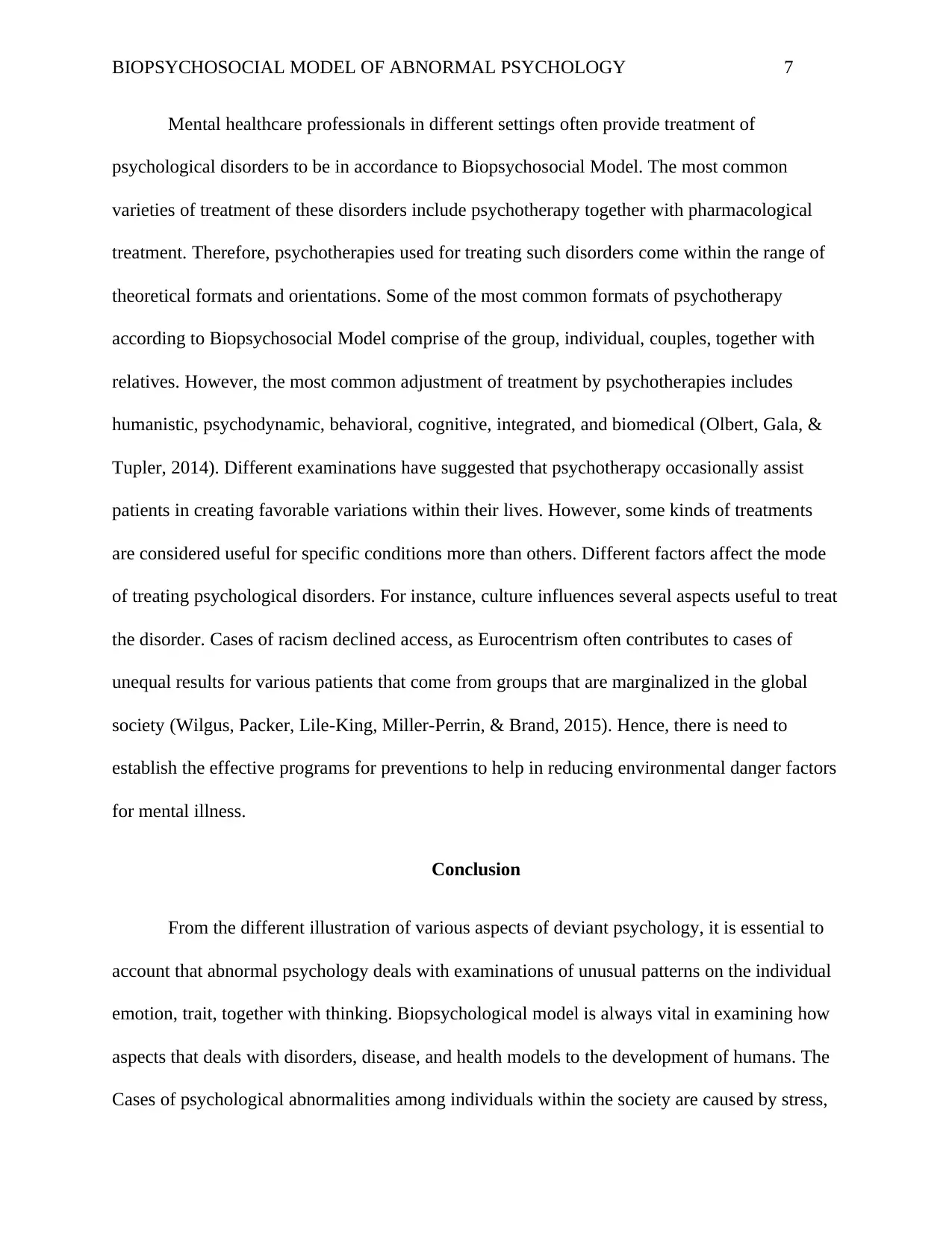
BIOPSYCHOSOCIAL MODEL OF ABNORMAL PSYCHOLOGY 7
Mental healthcare professionals in different settings often provide treatment of
psychological disorders to be in accordance to Biopsychosocial Model. The most common
varieties of treatment of these disorders include psychotherapy together with pharmacological
treatment. Therefore, psychotherapies used for treating such disorders come within the range of
theoretical formats and orientations. Some of the most common formats of psychotherapy
according to Biopsychosocial Model comprise of the group, individual, couples, together with
relatives. However, the most common adjustment of treatment by psychotherapies includes
humanistic, psychodynamic, behavioral, cognitive, integrated, and biomedical (Olbert, Gala, &
Tupler, 2014). Different examinations have suggested that psychotherapy occasionally assist
patients in creating favorable variations within their lives. However, some kinds of treatments
are considered useful for specific conditions more than others. Different factors affect the mode
of treating psychological disorders. For instance, culture influences several aspects useful to treat
the disorder. Cases of racism declined access, as Eurocentrism often contributes to cases of
unequal results for various patients that come from groups that are marginalized in the global
society (Wilgus, Packer, Lile-King, Miller-Perrin, & Brand, 2015). Hence, there is need to
establish the effective programs for preventions to help in reducing environmental danger factors
for mental illness.
Conclusion
From the different illustration of various aspects of deviant psychology, it is essential to
account that abnormal psychology deals with examinations of unusual patterns on the individual
emotion, trait, together with thinking. Biopsychological model is always vital in examining how
aspects that deals with disorders, disease, and health models to the development of humans. The
Cases of psychological abnormalities among individuals within the society are caused by stress,
Mental healthcare professionals in different settings often provide treatment of
psychological disorders to be in accordance to Biopsychosocial Model. The most common
varieties of treatment of these disorders include psychotherapy together with pharmacological
treatment. Therefore, psychotherapies used for treating such disorders come within the range of
theoretical formats and orientations. Some of the most common formats of psychotherapy
according to Biopsychosocial Model comprise of the group, individual, couples, together with
relatives. However, the most common adjustment of treatment by psychotherapies includes
humanistic, psychodynamic, behavioral, cognitive, integrated, and biomedical (Olbert, Gala, &
Tupler, 2014). Different examinations have suggested that psychotherapy occasionally assist
patients in creating favorable variations within their lives. However, some kinds of treatments
are considered useful for specific conditions more than others. Different factors affect the mode
of treating psychological disorders. For instance, culture influences several aspects useful to treat
the disorder. Cases of racism declined access, as Eurocentrism often contributes to cases of
unequal results for various patients that come from groups that are marginalized in the global
society (Wilgus, Packer, Lile-King, Miller-Perrin, & Brand, 2015). Hence, there is need to
establish the effective programs for preventions to help in reducing environmental danger factors
for mental illness.
Conclusion
From the different illustration of various aspects of deviant psychology, it is essential to
account that abnormal psychology deals with examinations of unusual patterns on the individual
emotion, trait, together with thinking. Biopsychological model is always vital in examining how
aspects that deals with disorders, disease, and health models to the development of humans. The
Cases of psychological abnormalities among individuals within the society are caused by stress,
Paraphrase This Document
Need a fresh take? Get an instant paraphrase of this document with our AI Paraphraser
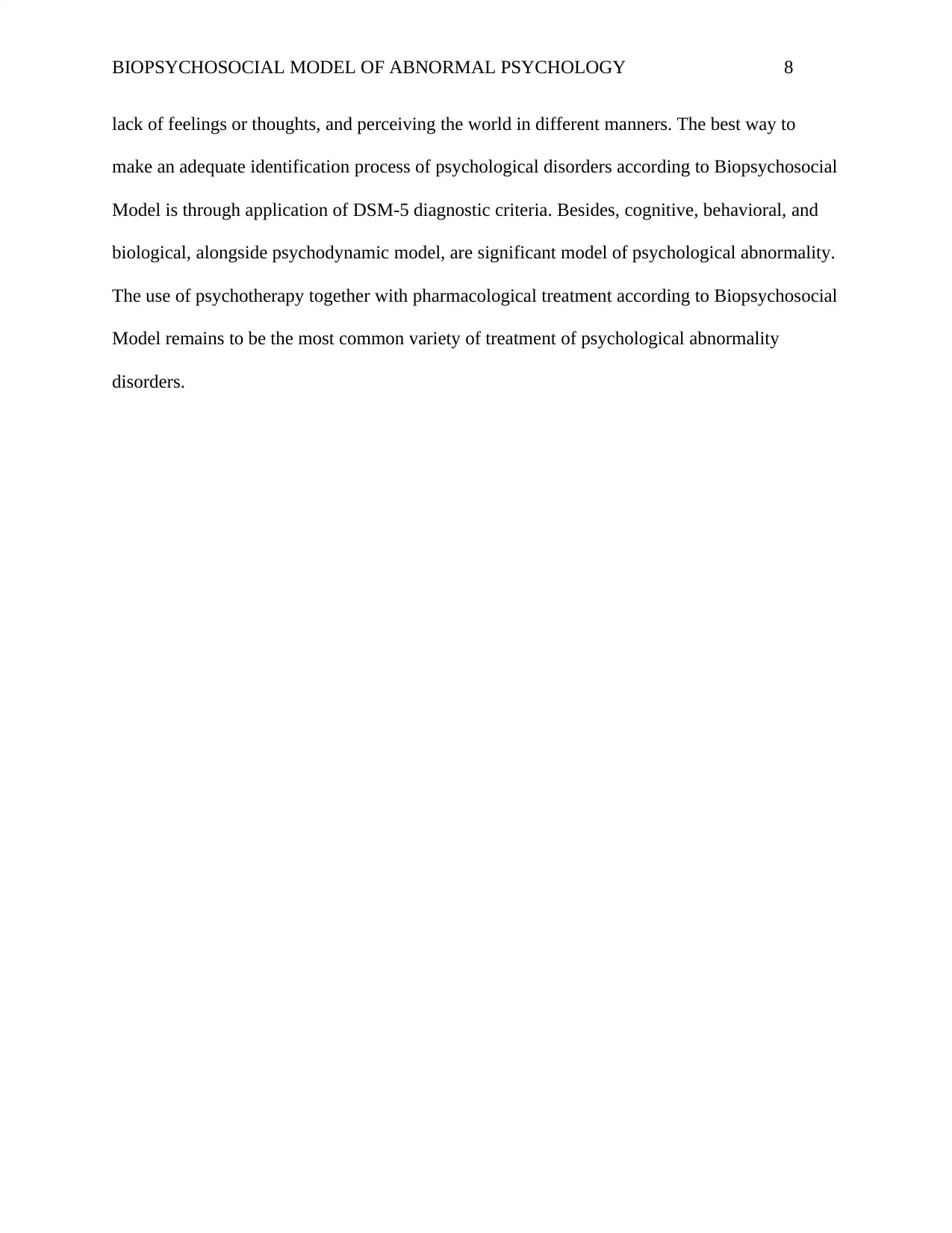
BIOPSYCHOSOCIAL MODEL OF ABNORMAL PSYCHOLOGY 8
lack of feelings or thoughts, and perceiving the world in different manners. The best way to
make an adequate identification process of psychological disorders according to Biopsychosocial
Model is through application of DSM-5 diagnostic criteria. Besides, cognitive, behavioral, and
biological, alongside psychodynamic model, are significant model of psychological abnormality.
The use of psychotherapy together with pharmacological treatment according to Biopsychosocial
Model remains to be the most common variety of treatment of psychological abnormality
disorders.
lack of feelings or thoughts, and perceiving the world in different manners. The best way to
make an adequate identification process of psychological disorders according to Biopsychosocial
Model is through application of DSM-5 diagnostic criteria. Besides, cognitive, behavioral, and
biological, alongside psychodynamic model, are significant model of psychological abnormality.
The use of psychotherapy together with pharmacological treatment according to Biopsychosocial
Model remains to be the most common variety of treatment of psychological abnormality
disorders.
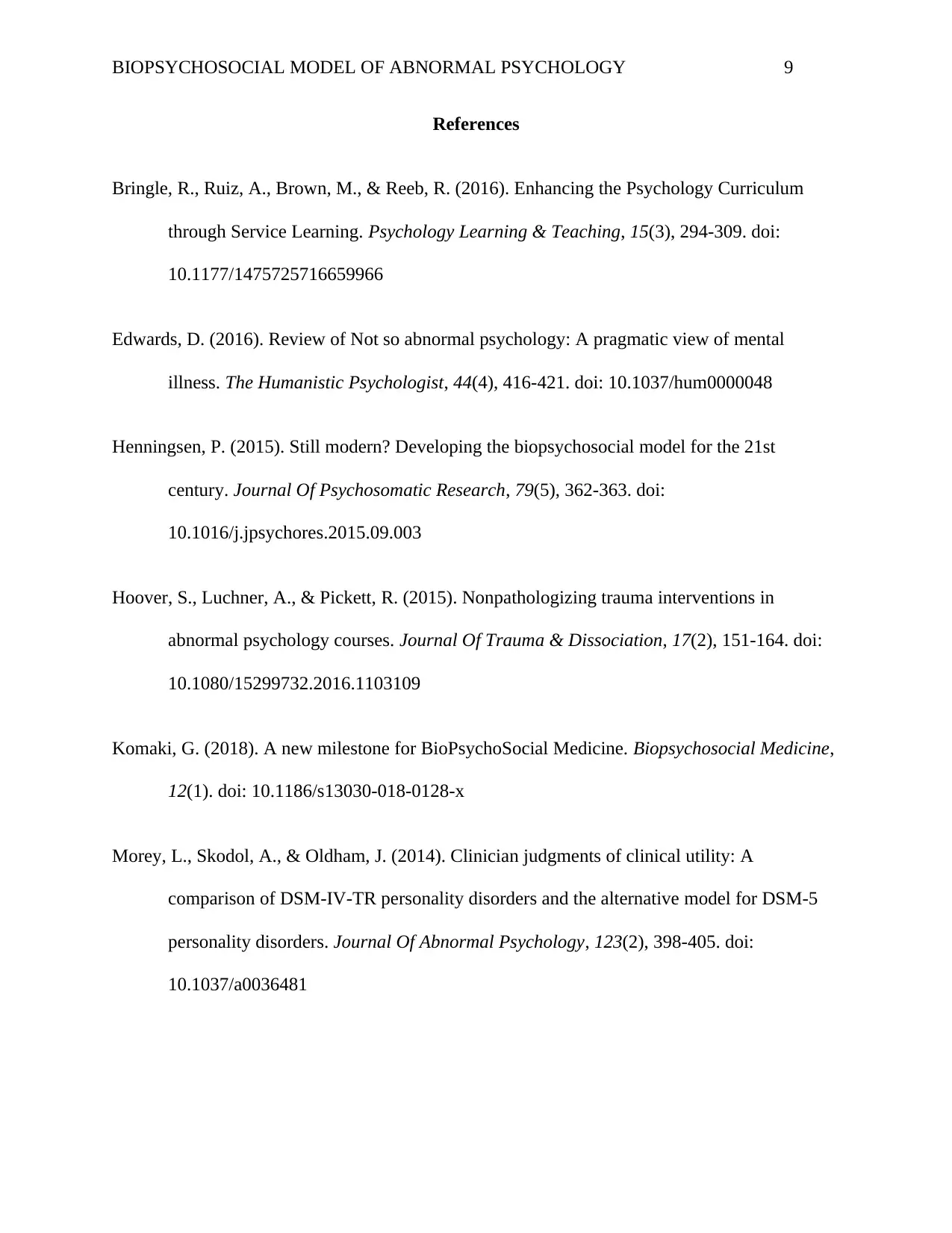
BIOPSYCHOSOCIAL MODEL OF ABNORMAL PSYCHOLOGY 9
References
Bringle, R., Ruiz, A., Brown, M., & Reeb, R. (2016). Enhancing the Psychology Curriculum
through Service Learning. Psychology Learning & Teaching, 15(3), 294-309. doi:
10.1177/1475725716659966
Edwards, D. (2016). Review of Not so abnormal psychology: A pragmatic view of mental
illness. The Humanistic Psychologist, 44(4), 416-421. doi: 10.1037/hum0000048
Henningsen, P. (2015). Still modern? Developing the biopsychosocial model for the 21st
century. Journal Of Psychosomatic Research, 79(5), 362-363. doi:
10.1016/j.jpsychores.2015.09.003
Hoover, S., Luchner, A., & Pickett, R. (2015). Nonpathologizing trauma interventions in
abnormal psychology courses. Journal Of Trauma & Dissociation, 17(2), 151-164. doi:
10.1080/15299732.2016.1103109
Komaki, G. (2018). A new milestone for BioPsychoSocial Medicine. Biopsychosocial Medicine,
12(1). doi: 10.1186/s13030-018-0128-x
Morey, L., Skodol, A., & Oldham, J. (2014). Clinician judgments of clinical utility: A
comparison of DSM-IV-TR personality disorders and the alternative model for DSM-5
personality disorders. Journal Of Abnormal Psychology, 123(2), 398-405. doi:
10.1037/a0036481
References
Bringle, R., Ruiz, A., Brown, M., & Reeb, R. (2016). Enhancing the Psychology Curriculum
through Service Learning. Psychology Learning & Teaching, 15(3), 294-309. doi:
10.1177/1475725716659966
Edwards, D. (2016). Review of Not so abnormal psychology: A pragmatic view of mental
illness. The Humanistic Psychologist, 44(4), 416-421. doi: 10.1037/hum0000048
Henningsen, P. (2015). Still modern? Developing the biopsychosocial model for the 21st
century. Journal Of Psychosomatic Research, 79(5), 362-363. doi:
10.1016/j.jpsychores.2015.09.003
Hoover, S., Luchner, A., & Pickett, R. (2015). Nonpathologizing trauma interventions in
abnormal psychology courses. Journal Of Trauma & Dissociation, 17(2), 151-164. doi:
10.1080/15299732.2016.1103109
Komaki, G. (2018). A new milestone for BioPsychoSocial Medicine. Biopsychosocial Medicine,
12(1). doi: 10.1186/s13030-018-0128-x
Morey, L., Skodol, A., & Oldham, J. (2014). Clinician judgments of clinical utility: A
comparison of DSM-IV-TR personality disorders and the alternative model for DSM-5
personality disorders. Journal Of Abnormal Psychology, 123(2), 398-405. doi:
10.1037/a0036481
⊘ This is a preview!⊘
Do you want full access?
Subscribe today to unlock all pages.

Trusted by 1+ million students worldwide
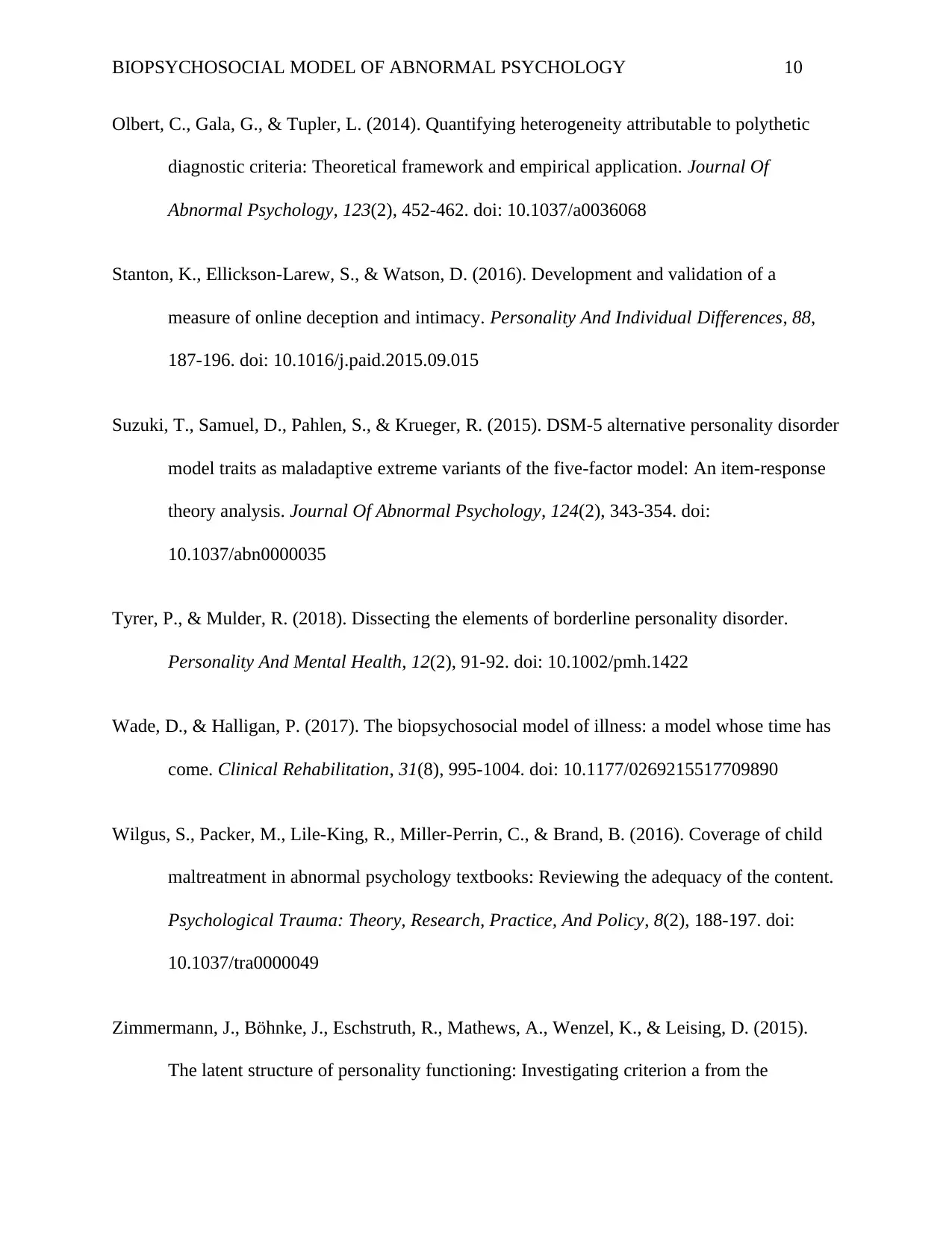
BIOPSYCHOSOCIAL MODEL OF ABNORMAL PSYCHOLOGY 10
Olbert, C., Gala, G., & Tupler, L. (2014). Quantifying heterogeneity attributable to polythetic
diagnostic criteria: Theoretical framework and empirical application. Journal Of
Abnormal Psychology, 123(2), 452-462. doi: 10.1037/a0036068
Stanton, K., Ellickson-Larew, S., & Watson, D. (2016). Development and validation of a
measure of online deception and intimacy. Personality And Individual Differences, 88,
187-196. doi: 10.1016/j.paid.2015.09.015
Suzuki, T., Samuel, D., Pahlen, S., & Krueger, R. (2015). DSM-5 alternative personality disorder
model traits as maladaptive extreme variants of the five-factor model: An item-response
theory analysis. Journal Of Abnormal Psychology, 124(2), 343-354. doi:
10.1037/abn0000035
Tyrer, P., & Mulder, R. (2018). Dissecting the elements of borderline personality disorder.
Personality And Mental Health, 12(2), 91-92. doi: 10.1002/pmh.1422
Wade, D., & Halligan, P. (2017). The biopsychosocial model of illness: a model whose time has
come. Clinical Rehabilitation, 31(8), 995-1004. doi: 10.1177/0269215517709890
Wilgus, S., Packer, M., Lile-King, R., Miller-Perrin, C., & Brand, B. (2016). Coverage of child
maltreatment in abnormal psychology textbooks: Reviewing the adequacy of the content.
Psychological Trauma: Theory, Research, Practice, And Policy, 8(2), 188-197. doi:
10.1037/tra0000049
Zimmermann, J., Böhnke, J., Eschstruth, R., Mathews, A., Wenzel, K., & Leising, D. (2015).
The latent structure of personality functioning: Investigating criterion a from the
Olbert, C., Gala, G., & Tupler, L. (2014). Quantifying heterogeneity attributable to polythetic
diagnostic criteria: Theoretical framework and empirical application. Journal Of
Abnormal Psychology, 123(2), 452-462. doi: 10.1037/a0036068
Stanton, K., Ellickson-Larew, S., & Watson, D. (2016). Development and validation of a
measure of online deception and intimacy. Personality And Individual Differences, 88,
187-196. doi: 10.1016/j.paid.2015.09.015
Suzuki, T., Samuel, D., Pahlen, S., & Krueger, R. (2015). DSM-5 alternative personality disorder
model traits as maladaptive extreme variants of the five-factor model: An item-response
theory analysis. Journal Of Abnormal Psychology, 124(2), 343-354. doi:
10.1037/abn0000035
Tyrer, P., & Mulder, R. (2018). Dissecting the elements of borderline personality disorder.
Personality And Mental Health, 12(2), 91-92. doi: 10.1002/pmh.1422
Wade, D., & Halligan, P. (2017). The biopsychosocial model of illness: a model whose time has
come. Clinical Rehabilitation, 31(8), 995-1004. doi: 10.1177/0269215517709890
Wilgus, S., Packer, M., Lile-King, R., Miller-Perrin, C., & Brand, B. (2016). Coverage of child
maltreatment in abnormal psychology textbooks: Reviewing the adequacy of the content.
Psychological Trauma: Theory, Research, Practice, And Policy, 8(2), 188-197. doi:
10.1037/tra0000049
Zimmermann, J., Böhnke, J., Eschstruth, R., Mathews, A., Wenzel, K., & Leising, D. (2015).
The latent structure of personality functioning: Investigating criterion a from the
Paraphrase This Document
Need a fresh take? Get an instant paraphrase of this document with our AI Paraphraser
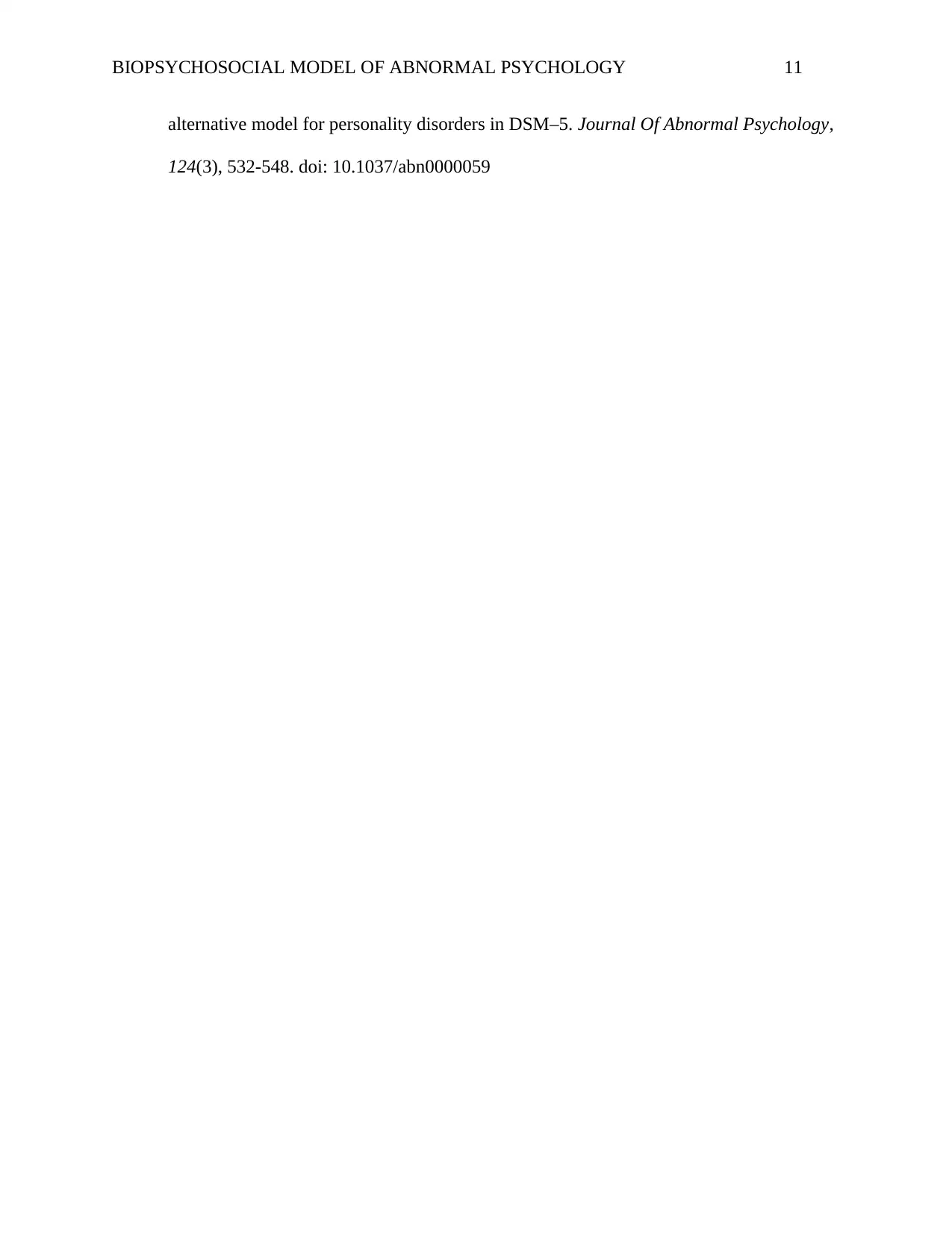
BIOPSYCHOSOCIAL MODEL OF ABNORMAL PSYCHOLOGY 11
alternative model for personality disorders in DSM–5. Journal Of Abnormal Psychology,
124(3), 532-548. doi: 10.1037/abn0000059
alternative model for personality disorders in DSM–5. Journal Of Abnormal Psychology,
124(3), 532-548. doi: 10.1037/abn0000059
1 out of 11
Related Documents
Your All-in-One AI-Powered Toolkit for Academic Success.
+13062052269
info@desklib.com
Available 24*7 on WhatsApp / Email
![[object Object]](/_next/static/media/star-bottom.7253800d.svg)
Unlock your academic potential
Copyright © 2020–2026 A2Z Services. All Rights Reserved. Developed and managed by ZUCOL.





